New Zealand imposes fresh sanctions on Russia, Iran over Ukraine war
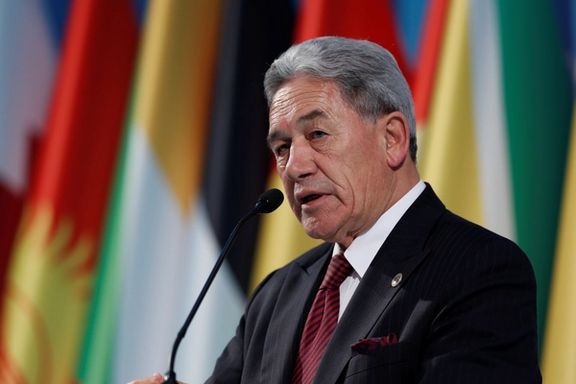
New Zealand announced further sanctions on Iranian actors involved in providing military assistance to Russia, specifically through the production and supply of drones.

New Zealand announced further sanctions on Iranian actors involved in providing military assistance to Russia, specifically through the production and supply of drones.
The new sanction package also includes Russian individuals and entities involved in the illegal transfer of weaponry from North Korea to Russia for use in Ukraine.
According to a statement by the New Zealand Foreign Ministry, these sanctions target seven individuals and 12 entities providing military support for Russia’s invasion of Ukraine.
The Iranian individuals are Mohsen Vahabzadeh Moghadam, Abbas Abdi Asjerd, and Ehsan Varnosfaderani. The list also includes entities such as Bonyan Danesh Shargh, Alvand Motorbuilding Industries Company, Pishro Sanat Aseman Sharif Company, and Saad Sazeh Faraz Sharif Company.
“New Zealand condemns all those who provide military support to Russia in its war of aggression against Ukraine. The supply of Iranian drones and North Korean weapons to Russia constitutes a threat to Ukraine’s sovereignty and territorial integrity,” Foreign Minister Winston Peters said in a statement on Thursday.
In May last year, New Zealand sanctioned 11 Iranian people and seven entities for supplying drones to Russia.
Since March 2022, New Zealand has imposed sanctions on more than 1,700 individuals and entities, along with a range of trade measures.
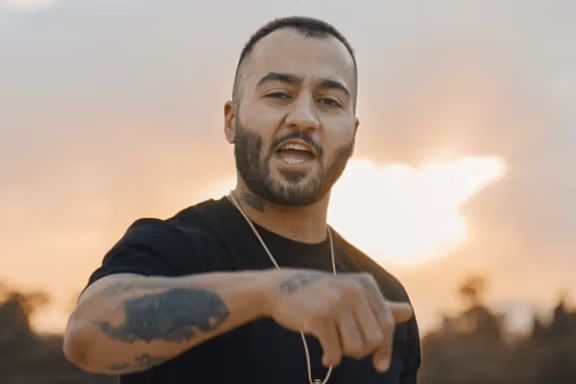
Rapper Toomaj Salehi is reportedly facing two new charges that advocates said is an attempt by Iranian authorities to keep the iconic voice of Iran's opposition behind bars.
The charges include 'spreading falsehoods' and 'spreading propaganda against the regime,' according to Negin Niknaam, an Iranian activist and Salehi's friend.
"I think they couldn't execute him because he's now famous. They're afraid of him. So one thing that the regime always does with famous people or artists in Iran is they try to isolate them or keep them in prison. I'm really worried about him," said Niknaam.
The new charges against Salehi could potentially be a crime punishable by death, said human rights lawyer Kaveh Shahrooz.
"Part of the problem with the usual charges they level against dissidents -- moharebeh (waging war on God) & endangering the regime -- is that they're incredibly vague and broad. So one is never really sure what is and is not a crime," said Shahrooz.
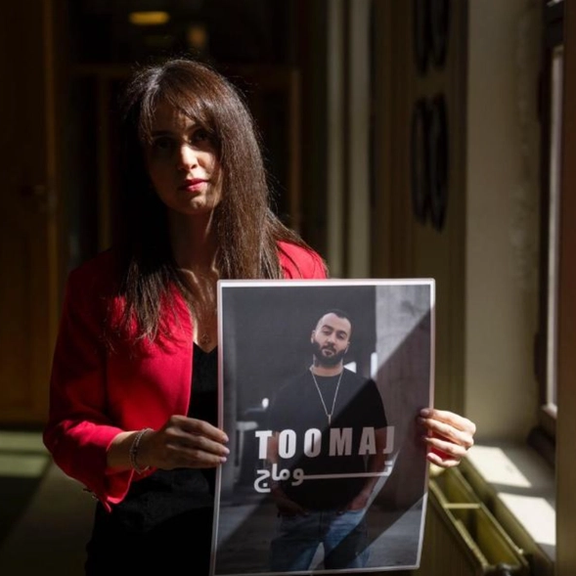
Salehi has been detained since October 31, 2022 in solitary confinement in Isfahan's Dastgerd Prison, which is a in a high-security ward controlled by the Islamic Revolutionary Guard Corps’ (IRGC) intelligence organization.
He rapped about political and social issues exposing the Islamic Republic's abuses through his lyrics. The rapper grew to international fame during the 2022 nationwide Woman- Life- Freedom moment, where he not only used his platform to echo the voice of protestors, but joined them in the streets.
In May, more than 100 music, culture and human rights icons, including Coldplay and Sting, signed a statement demanding Salehi's immediate release.
After international outcry and pressure, Salehi's death sentence was overturned by Iran's Supreme Court in June and less than two weeks after his release on bail, he was rearrested.
The hope of another bail release seems unlikely now, said Niknaam.
"I'm really depressed because we were excited. We were really excited that we heard that he may come out soon," she said.
German Member of Parliament (MP) YeOne Rhie, Salehi’s political sponsor, believes the Iranian government is plotting to keep the critic behind bars.
"I am asking myself why are they doing that? And I think the only reason is because they are so afraid of him that they don't want him out and freedom," said Rhie.
Toomaj is not the first famous activist to have his prison term extended.
Jailed Noble peace prize winner Narges Mohammadi is serving multiple sentences, which amounts to more than 13 years of imprisonment for her human rights activism. Her sentence was extended in January with an additional 15-months in for new charges concerning “spreading propaganda against the state."
Niknaam said she doesn't understand the rationale for the new charges.
"How can someone in prison spread lies or spread propaganda against the regime?...he's in prison, and he's only allowed to call his father and no one else," she added.
Rhie said Iran's new president elect, Masoud Pezeshkian, who was supported by Iran's Reform Front and is portrayed as a reformer, should take action.
"If the new president wants the Western world to believe that he has a reform and he wants to bring more freedom and democracy to the country, he should start right now and he should start with releasing all the innocent people."
Rhie said it would be symbolic for Pezeshkian to order the release of a figure like Salehi, who is often described as the "voice of the people of Iran" and the "son of Iran" but that still wouldn't be enough.
"Because we all know that there are over 20,000 other political prisoners," said Rhie.
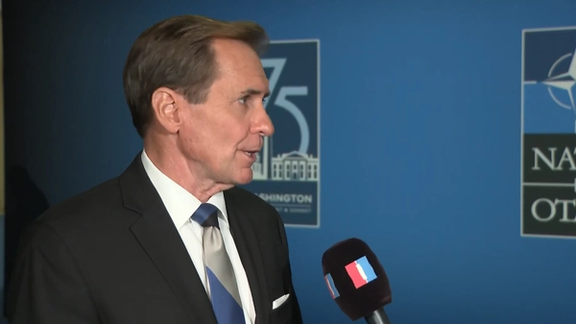
The US is not engaged in any nuclear talks with Iran, the White House national security spokesman told Iran International on Thursday, denying the Iranian top diplomat's claim about ongoing nuclear negotiations between Tehran and Washington via Oman.
Earlier in the day, Iran's acting foreign minister Ali Bagheri Kani said nuclear talks with the US are ongoing through indirect negotiations mediated by Oman.
However, White House national security communications advisor John Kirby categorically denied Bagheri's remarks and said, "No active negotiations are going on right now with respect to Iran's nuclear ambitions."
"I won't speak or can't speak to channels of communication with Iran one way or the other, but there are no active negotiations going on to restore the nuclear deal," Kirby told Iran International's Samira Gharaei on the sidelines of the North Atlantic Treaty Organization (NATO)'s summit in Washington DC.
Kirby said "the reason for that is because Iran was killing its own people in protests activity. Iran was continuing to spin centrifuges. Iran was continuing to support terrorist groups. And in the early stages of the negotiations, Iran was making unnecessary demands that made it impossible for us to do that. They weren't negotiating in good faith."
The White House national security spokesman reiterated the US president's commitment to making sure Tehran would never develop nuclear weapons, and said, "We'd love to be able to do that through diplomacy. But right now, there's not a path, a diplomatic path ahead of us."
Earlier in the day, US Senator James Lankford (R-OK) told Iran International's Arash Alaei that Washington had not engaged in direct negotiations with Tehran for a long time for a “good reason," pointing out to the oppressive nature of the Iranian government.
He referred to reports by the UN’s nuclear watchdog on Iran’s nuclear activities, saying, “The administration told us they are not engaged in (talks with) them. But obviously the IAEA has told us there is a lot of nuclear development that’s happening there and a lot of things they’re not able to see but what they are able to see and detect has pretty dramatic increases.”
The US senator's comments came after Bagheri Kani said on state TV that details of ongoing negotiations might be kept secret due to their sensitive nature.
“Given the confidential nature of these negotiations, the specific components may not be fully disclosed. However, I can emphasize that the trajectory of lifting sanctions is decidedly progressive,” Bagheri Kani said during a special news program.
The current administration is trying to "achieve significant progress before the incoming government takes office,” Bagheri Kani added, referring to the new president, Masoud Pezeshkian.
Kirby had stated on Monday that the US is not willing to resume nuclear talks with the new Iranian president, citing Tehran's policy of supporting terrorism as a significant obstacle.
Asked whether the election will change the US negotiating position, Kirby simply answered, "no".
According to Bagheri Kani, negotiations with the West have been "intensive" over the past three years, with a notable "pause" in February 2022 which he attributed to Russia’s invasion of Ukraine.
Since then, Iran has exceeded uranium enrichment limits and is now "weeks not months" away from a nuclear weapon, according to the UN's nuclear chief.
During his election campaign, Iran's next president spoke of promoting constructive talks with Western powers to revive the 2015 nuclear deal (JCPOA) and to lift the sanctions that have crippled the Iranian economy since the withdrawal of the US from the agreement in 2018.
However, with Iran's Supreme Leader holding the keys to the country's foreign policy, it is unlikely the new figurehead will be able to truly change course while Iran's proxies wreaking havoc across the Middle East.
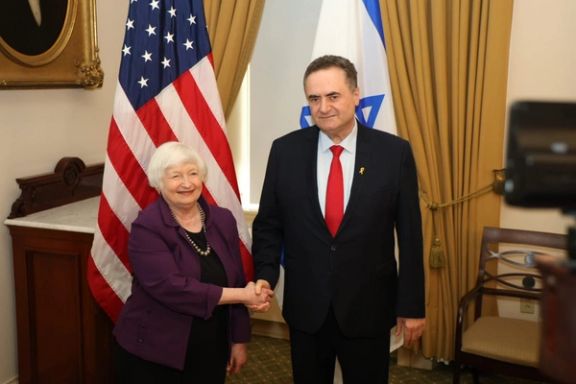
US Treasury Secretary Janet Yellen met with Israeli Foreign Minister Israel Katz on Wednesday to discuss measures aimed at disrupting Iran and its proxies, including Hezbollah and Hamas.
During the meeting which took place in Washington DC on the sidelines of the NATO Summit Yellen "outlined Treasury actions to disrupt Iran and its proxies including Hezbollah and Hamas," said a readout from the US Treasury Department.
Yellen further emphasized the importance of information sharing between the US and Israel to counter Iran's influence.
"Secretary Yellen welcomed additional information sharing with Israel and noted that ongoing collaboration to combat terrorist financing has yielded fruitful results with respect to countering Iranian financial and military support to Hamas, Hezbollah, and its other regional partners and proxies," the readout added.
In a post on social media platform X, Israel Katz stated that during the meeting he expressed gratitude for US support while urging for increased US sanctions against Iran in cooperation with Europe.
"I thanked her for the American support for Israel and reviewed Iran's activities as the leader of the axis of evil against Israel, the US, and the entire free world. I emphasized that now is the time to impose severe sanctions on Iran, led by the US and in cooperation with European countries, to stop its nuclear and missile activities and support for terrorist organizations..."
This meeting follows a contentious debate on Tuesday where Congressman Mike Lawler accused Yellen of lax enforcement of sanctions aimed at curtailing Iran's oil trade with China.
In late June, diplomats quoted by the German Press Agency (DPA) indicated that several EU countries, including Germany, are advocating for the designation of Iran’s Islamic Revolutionary Guard Corps (IRGC) IRGC as a terrorist organization based on a ruling by the High Court in Düsseldorf linking a 2022 synagogue attack in Bochum to Iranian state authorities.
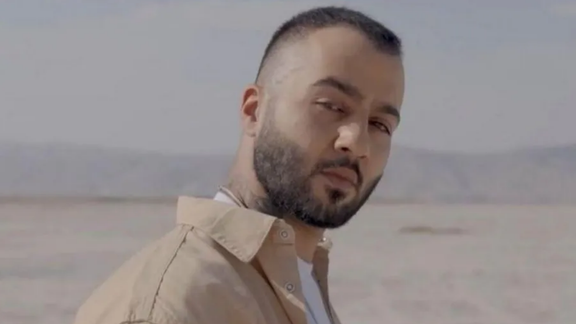
Two new charges have been brought against jailed Iranian rapper Toomaj Salehi, whose death sentence was overturned by Iran's Supreme Court in June.
Without revealing details, Salehi's social media page administrator disclosed new charges against him on X on Thursday, adding, "Intelligence agents with the cooperation of judicial officers are opening two new cases with false charges against Toomaj Salehi."
German MP YeOne Rhie, Salehi’s political sponsor, also reported the new charges, saying that the Iranian government does not want to release Toomaj so the authorities have levied new charges against him.
“The Iranian regime is afraid. Afraid of releasing Toomaj…that is the only reason for the new, completely abstruse charges, which once again lack any basis in the rule of law,” Salehi’s political sponsor German MP YeOne Rhie wrote on X reacting to the news.
In June this year, a death sentence against the rapper was overturned by Iran’s Supreme Court. His lawyer Amir Raisian announced that the case had been referred to a parallel branch for consideration.
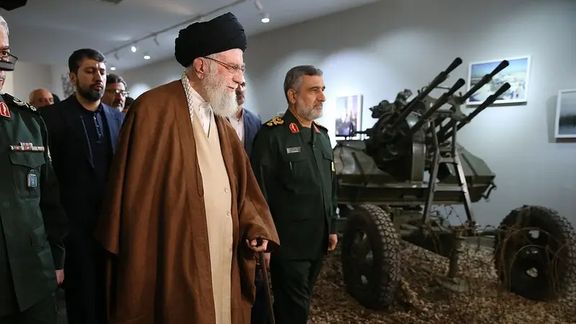
Amir Ali Hajizadeh, commander of the Islamic Revolutionary Guard Corps (IRGC) Aerospace Force, touted Supreme Leader Ali Khamenei as the ultimate winner in Iran’s recent presidential election.
The assertion, made in an article for the IRGC-affiliated Javan newspaper Thursday, underscores the entrenchment of Khamenei's influence over Iran’s political machinery. Hajizadeh’s words were unequivocal: "Today, the Islamic system, the Iranian nation, and above all, Khamenei are the victors, and the president's vote should not be questioned."
This statement comes in the wake of the election of Masoud Pezeshkian, following the sudden death of President Ebrahim Raisi. The transition of power, which appeared smooth and controlled, reinforces the perception of political stability under Khamenei's system, as well as his tight control over the electoral process through the Guardian Council.
Its un-elected members play a pivotal role in vetting and approving presidential candidates, ensuring that Pezeshkian’s presidency would align with Khamenei’s broader strategic objectives.
Hajizadeh also urged supporters of Saeed Jalili, the defeated candidate in the election, to "refrain from any comments about the election and any statements that could be interpreted as undermining Masoud Pezeshkian's vote."
He stated that Masoud Pezeshkian is the president of "the entire nation and every single person in Iran and is supported by revolutionary forces."
He added that support for a particular candidate and competition are relevant only before the election.
Critics argue that the recent elections simply reflect a consolidation of power within pro-Khamenei factions, effectively continuing his vision across critical domains such as foreign and military policy, economic strategy, and internal governance.
Lawmaker Mehrdad Goodarzi suggested that the voter turnout was a testament to Khamenei's leadership, despite it being nearly 40% in the first round, the lowest in presidential elections in the history of the Islamic Republic.
The low turnout barely reached 50% in the runoff according to official figures that cannot be independently verified. "The people's participation in the elections was the result of Khamenei's measures and the people's trust in the country, the homeland, and the governmental structures," Goodarzi said.
The narrative positioning Khamenei as the principal victor not only bolsters his legitimacy among his followers but also portrays the electoral process as a direct manifestation of his authoritarian command. It signals that any political transition or policy continuity is merely an extension of his influence.
The US openly said the elections are "not free or fair" in spite of allowing remote polling booths across America.
Amid the tightly controlled campaign, Khamenei's office issued a warning against the 'misquoting’ of the Supreme Leader and his officials by presidential candidates.
The office criticized what it called "incomplete or incorrect references" made by presidential candidates and their associates, insisting that all quotes must be verified through official documents.
Patrick Clawson from the Washington Institute said Khamenei has historically kept senior IRGC figures outside the presidency in order to retain a firm control over his number two. The IRGC, designated a terror group by countries such as the US, remains deeply entrenched in the country's political and economic machinery. It is closely under Khamenei's watch but its leaders are kept out of the presidential field.
"Most famously, he [Khamenei] refuses to allow talk about who will succeed him and has not named a deputy," Clawson said. "In addition, he has created a multitude of competing institutions with overlapping responsibilities and has moved previously powerful figures into shadowy positions at those institutions or made them into one of many advisors."
It means that over the years, Iran's presidents have ultimately lacked true power. "Khatami complained openly that he had no authority over some of his most important cabinet members, including the minister of intelligence, who had been chosen by Khamenei," added Clawson.
In addition, when Raisi took office in 2021, though it was believed he would wield more power and widely felt to be being groomed as Khamenei's successor, "that did not prove decisive ... and he was not particularly consequential in decision making."